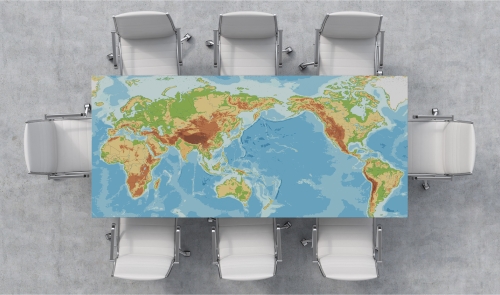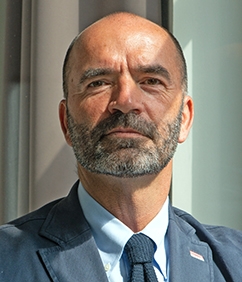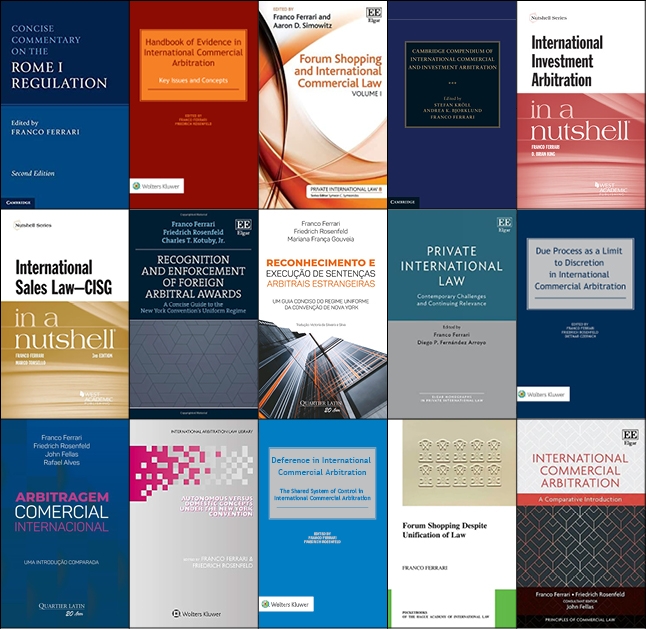Global Resolution: Through his prolific scholarship, Franco Ferrari is aiming to systematize approaches to international arbitration

A one-man publishing house appears to be operating out of 409B Vanderbilt Hall. That’s the office of Professor Franco Ferrari, who since 1992 has authored or edited (solo and with colleagues) 47 books, 15 of them from 2020 to the present. His latest opus: the just-published Cambridge Compendium of International Commercial and Investment Arbitration, a three-volume, 2,055-page work for which he served as a co-editor. Other recent books by Ferrari have addressed topics such as forum shopping, evidence, and recognition and enforcement of foreign arbitral awards.
Ferrari is director of the Law School’s Center for Transnational Litigation, Arbitration, and Commercial Law, which was established to advance the study and practice of international business transactions and resolution of related disputes. International arbitration is a significant area of law practice. Ferrari points to statistics from arbitration organizations in the United States, China, and Singapore showing that international commercial arbitration claims filed in these countries alone in 2022 totaled at least $39 billion.
Several years in the making, the Cambridge Compendium is one of Ferrari’s most ambitious projects. “With 67 entries covering all aspects of international commercial and investment arbitration, this is more than a mere ‘compendium,’” observes Herbert and Rose Rubin Professor of International Law José Alvarez, who teaches and writes about foreign investment and dispute resolution. “It is really an encyclopedia, and one that is all the more valuable and unique for covering two distinct forms of arbitration that are most often treated in separate silos.”
This was exactly the goal, says Ferrari. Commercial arbitration generally involves disputes between private parties, such as breach-of-contract claims; investment arbitration deals with disputes between private parties and nation states—for example, cases involving expropriation of assets. “Very often they’re being dealt with as two completely different systems, without much overlap,” he says. “Our idea was to show that there are a lot of common traits, there is a lot of cross-fertilization.”
The target audience for the Cambridge Compendium, Ferrari says, is both scholars and practitioners. Ferrari himself wears both hats, having been appointed as an arbitrator in commercial and investment arbitrations on numerous occasions. His multitude of other publications similarly straddle the academic and the practical. The Edward Elgar Publishing webpage for International Commercial Arbitration: A Comparative Introduction, a 2021 book co-authored by Ferrari, contains a typical description for his work, noting, “Scholars and students…across the globe will find this book invaluable for its comparative analysis. It will also be most useful for arbitration practitioners and judges.”
Raised in Germany by an Italian mother, Ferrari is a polyglot, speaking German, Italian, English, French, Spanish, and Dutch. While he sometimes writes in Italian, he employs other languages for particular topics. He writes in English, for example, when the subject is arbitration, while for conflict of laws, Ferrari says, “it has to be German, because German is a very precise language, and because conflict of laws is an area I started studying in German.” His books are often translated into other languages as well, and in such instances, he typically adds chapters relevant to a particular country. Last year, International Commercial Arbitration was published in Portuguese, supplemented with material on Brazil and Portugal. A Spanish edition is forthcoming, to which materials from many Spanish speaking countries were added.
What motivates Ferrari to be so prolific? In part, he says, there is a big void to fill. “Tort law is much more developed,” he notes. “Contract law is more developed. For hundreds of years, scholars have written about many, many aspects of these fields. Arbitration is not like that. Even though it has Roman roots, it is fairly new. It lacks a bigger view; it lacks systemization. And this is what I’ve been doing, basically since I came to NYU 13 years ago.”
Posted on June 15, 2023



